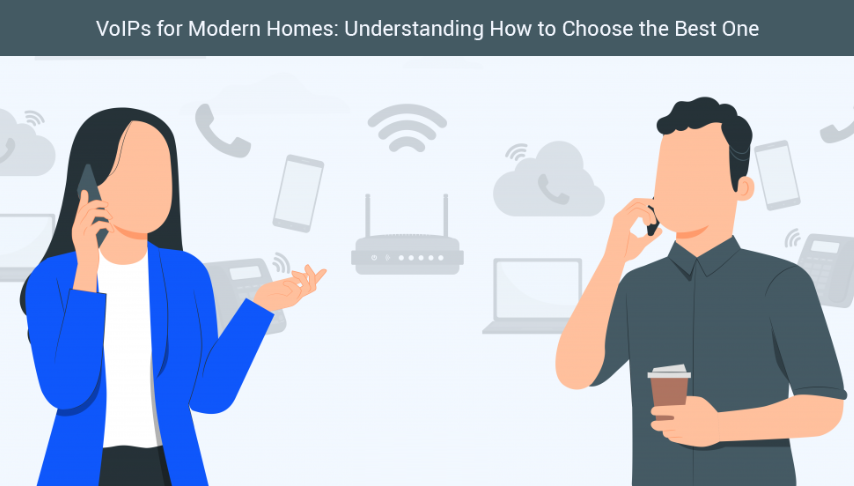VoIP has existed in the business world for a long time. But now ever since the pandemic, it has been seen as a replacement for traditional phone lines for homes too. And clearly, the evidence is surmountable. VoIP has many features not found in landline networks while being cost-effective too.
VoIP eliminates the need for conventional landline lines as it runs on the Internet. It means VoIP sends data in the form of bits. It lets people communicate in far-off locations as long as they have a decent Internet connection.
And as technology has progressed, VoIP services have only gotten better with time. There have been improvements in terms of stability and audio clarity as well as faster connection speeds. VoIP also has many advanced features built-in etc
And now we are getting to see VoIP in the domestic sector as well, despite it dominating the business and corporate sphere. And due to landlines becoming less feasible in today’s fast-paced society due to the high expenses, we are seeing more consumers adopt VoIP solutions for homes too.
Meanwhile, landline calls are still expensive due to installation and maintenance fees. Not to mention the hidden costs that are added for every call especially if it’s a non-domestic call. Landline connections will slowly become obsolete thanks to the high cost of international calls alone.
And research backs these claims. An estimated 3 billion people use mobile VoIP services. Using VoIP can also lower the cost by 45% compared to traditional phones, increase productivity by 67%, improve voice quality, and save employer’s costs by enabling employees to work from home.
But since the VoIP industry is filled to the brim with stiff competition, choosing the right VoIP for your home isn’t an easy process. So to help you ease into this thrilling prospect, I am here to show you 5 tips that will help pick the right one.
- How Many Calls Are Allowed?
The first step you need to check when switching to VoIP at home is to check how many calls can be made in a day and at what cost. This will depend on how many users plan to use the service.
So first you have to take a headcount of your house members who would be planning to make calls and how frequently they used to make them when you were on a landline network.
Some VoIP services offer discounts as well for a “family package” when more than one user signs up for the service. So always check your monthly calls before signing up to any VoIP provider.
- How Advanced is Its Call Management Portal?
This might seem pretty obvious but when you’re making a switch to VoIP, you should check what additional features you will be getting. So it’s a good idea to look at its call management portal and other modern functionality.
When checking out the VoIP portal, you might notice a few features that you need such as user account management, call recording and playback, emergency calling, conference calling, and screen sharing. But there will be tons of features that are not particularly useful for you.
So make a checklist of the basic feature requirements your VoIP should have and if it is charging extra for features that you don’t need, you can cross off that service provider from your list of potential VoIP purchases.
- Call Quality and Reliability
Always keep in mind that no two VoIP services are created equal. This means there will always be some differences in call quality and reliability. So go for one that doesn’t have any latency issues or background noise when making important calls.
Also, check for VoIP uptime. Don’t expect any service provider to offer 100% uptime because any service can face technical difficulties or downtime because of server maintenance, server upgrades, etc.
Plus, they run on the internet so there’s always a risk of things going awry. So check how much uptime the VoIP you are going for offers in its SLA. And higher the upload time figure, the more reliable the service will be.
- Does it Allow International Calls?
An important question you need to ask yourself is whether you will be making international calls from home. If yes, how frequently? If you will be making frequent international calls, then you should look for a VoIP that allows international calls at a nominal cost.
The price will be a major factor in selecting a provider that’s right for you because if you have relatives living outside your home country, it might ultimately come down to price. However, the lowest cost may not always have the best service since other factors such as service quality, customer support, service plan options, and others carry a lot of weight on the final decision for a VoIP provider.
- Does it Allow Number Porting?
Switching network providers while keeping the same number might be challenging. If you don’t already know, VoIP number porting, also known as number portability, lets you move an active phone number to a different service provider. You can continue using the same number while using another carrier.
This relieves home-office users from frequently updating their phone numbers in directories and online resources, and it spares businesses the expense of having to realign their branding and clientele.
If number porting did not exist, users would need to obtain a new phone number each time they changed carriers or service providers.
Porting phone numbers is a key component in the fiercely competitive VoIP industry. Any VoIP provider who neglects VoIP number porting capability will inevitably get left behind.
So check your VoIP carrier to ensure that it offers number porting otherwise it can be a hassle changing your number and informing all your contacts about your updated information.
Which VoIP is Right?
Axvoice is a great choice for a robust and economical VoIP provider. It has all these features, including number porting at an extremely low price, and the service is reliable and calls are crystal clear with minimum noise.
Axvoice is one solution that brings advanced VoIP features to your home. For a single connection, their residential setup only costs $8.25 per month, and the service does not charge any hidden fees.
Additionally, Axvoice offers free hardware and offers unlimited local and international calls for a fixed monthly charge. Their customer service is available around the clock and can help set up your devices for VoIP for free.
If we go by the costs alone, a VoIP service is much more practical than landline networks. On average traditional phone lines or a landline phone system (POTS) costs $50 per month per connection. And it can be even higher depending on how many international calls are made.
This isn’t the case with Axvoice because it doesn’t incur hidden charges when making international costs. Plus, its number porting process is very easy. When you join the service, the customer service will help you along with the entire process if you decide to port your number.
Once your Axvoice subscription purchase is complete, the sales staff will contact you to obtain the necessary documentation to begin the porting process. You may also email the Axvoice VoIP phone service to start the process.
To know more about how you can port your number to Axvoice, visit this page.
VoIP is the Future
On average, a VoIP costs $20 per month which is less than half of what a landline network connection will charge you. I is perfect for households that make a lot of calls but are looking for a reliable and cheaper option.
Most VoIP networks have a better track record than landline networks because of extra security measures and advanced features such as conference calling, screen sharing, and video calls.
Even if these features might seem excessive to you now, there will be a situation where you might need them which is why VoIP is the future and you should consider to switching to one.








